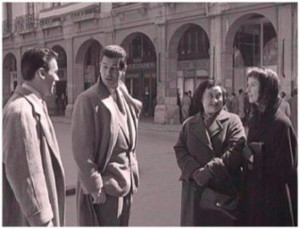Written in January 2014 for my 34th bimonthly En movimiento column for Caiman Cuadernos de Cine. — J.R.
Film history can be regarded as a succession of encounters between viewers and films in which particular conditions and contexts (pedagogical, historical, ideological, cultural, and/or circumstantial) tend to shape and even determine the content of what’s seen as well as ignored. This produces many striking discrepancies and disparities when one shifts from one national culture to another.
Almost half a century passed between the time I saw my first Elio Petri film (The 10th Victim, 1965) and the time I saw my second (Investigation of a Citizen Above Suspicion, 1970), the latter occasioned by a recent DVD and Blu-Ray release by Criterion. I’m sure that many of the reasons for this are haphazard and without any particular significance. But a feature-length documentary about Petri (1929-1982) included in the Criterion release, revealing that he was a member of the Italian Communist party who consciously avoided making films that would type-cast him as an arthouse director, makes me realize that, as an American — even one who was living in Paris when Investigation came out — I was unconsciously affected by a Cold War context that kept most of Petri’s later films invisible to me. And I’m sure that it was the same sort of context that prevented me from encountering the work of Juan Antonio Bardem until I saw Calle Mayor (1956) at a Betsy Blair tribute in Bologna in 2005, which has left me with a rift between European friends of mine who now consider Bardem unfashionably old-hat and my own sense that the film is a major and (for me) unheralded antifascist statement. By the same token, the impact of an American feature from 1997, Neil LaBute’s In the Company of Men, on American critics wasn’t matched by its European impact because the critique of capitalism in terms of sexual behavior, which yielded a story quite similar to Bardem’s, wasn’t a violation of cultural taboos in the same fashion for European audiences.

 I’m currently experiencing an even greater discrepancy after seeing an online preview of Steve James’ feature-length documentary about the late American film critic Roger Ebert (1942-2013) Life Itself, which has just had its world premiere at Sundance—a discrepancy made even more dramatic by the fact that I’m one of Ebert’s American colleagues who is interviewed in the film. For a good many Americans, and largely because of his profile as a TV personality, Ebert was the greatest and most important of all film critics. Within this context, his importance remains virtually unassailable, but within a more global context, such a judgment becomes impossible to sustain — reminding me that, as Serge Daney pointed out in one of his own last TV appearances (in France), Marshall McLuhan’s description in the 1960s of television as a “global village” was still valid only if one placed the emphasis on “village” rather than on “global”.
I’m currently experiencing an even greater discrepancy after seeing an online preview of Steve James’ feature-length documentary about the late American film critic Roger Ebert (1942-2013) Life Itself, which has just had its world premiere at Sundance—a discrepancy made even more dramatic by the fact that I’m one of Ebert’s American colleagues who is interviewed in the film. For a good many Americans, and largely because of his profile as a TV personality, Ebert was the greatest and most important of all film critics. Within this context, his importance remains virtually unassailable, but within a more global context, such a judgment becomes impossible to sustain — reminding me that, as Serge Daney pointed out in one of his own last TV appearances (in France), Marshall McLuhan’s description in the 1960s of television as a “global village” was still valid only if one placed the emphasis on “village” rather than on “global”.
For me, Ebert was a good if unexceptional mainstream critic who used his power in a way that made him exceptional and important in an American context, but not especially significant in wider terms. Despite our differences in taste and orientation, he was generous enough to furnish my most recent collection of essays with a blurb, and he was supportive in many other ways. His long-running TV show, which he mainly shared with Gene Siskel (1946-1999) — a reviewer who was less knowledgeable about (or interested in) film history — was far more adventurous in establishing a cinematic canon than the Academy Awards. But it was also much less adventurous than Cahiers du Cinéma or Sight and Sound or Film Comment, and it was far closer to the Academy Awards than it was to any of these magazines when it came to establishing which films and filmmakers were worthy of discussion. And any American cinephile who spends much time on Facebook can tell you that even those with the most advanced and pluralistic film taste typically accept the routine exclusions of the Academy Awards as a fact of nature, not as a subject worthy of critical dispute. The difference in contexts is not merely between mainstream media and niche markets. It is also a difference between national and international orientations, encompassing different histories, different expectations, and, ultimately, different cinemas.



